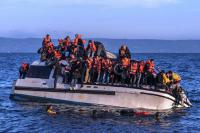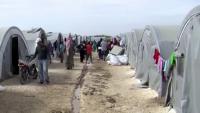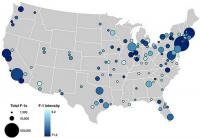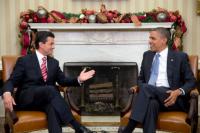-
Terrorists may have entered Europe hiding among asylum-seekers: EU border police

Frontex, the EU’s border police, has said that terrorists may have entered Europe by hiding among asylum seekers. Frontex noted that two of the bombers in last November’s Paris attacks made it to the continent in a smuggling boat from Turkey. “As the vast majority of migrants arrive undocumented, screening activities are essential to properly verify their declaration of nationality,” the report says.
-
-
EU governments may have deliberately allowed migrants in to boost domestic economies

Border controls which allow migrants to bypass them may have been part of a deliberate policy to boost domestic economies and garner party-political support, according to a new study. A study found that migrants have often been essential to domestic political and economic interests such as serving the needs of large informal labor markets that rely on cheap labor. As a result, policies and practices of border control which purport to exclude all migrants can in fact be imperfect by design.
-
-
EU cities have 900 “no-go zones”: Hungary’s government
Hungary’s right-wing government, ahead of a national referendum on the question of EU-mandated refugee quotas for EU member states, has claimed in a Web site post which supports the government’s anti-migration stance, that there are 900 “no-go zones” in London, Paris, Stockholm, and Berlin. The government Web page, entitled “We say no to mandatory migrant quotas,” defines the 900 “no-go zones” as “neighborhoods not under control, or hardly kept under control,” where “the norms of the host society … barely prevail.”
-
-
Texas’s E-Verify law operating under honor system
After former Gov. Rick Perry issued an executive order in December 2014 mandating the use of E-Verify for state agencies, some lawmakers noted the directive lacked a mechanism to ensure compliance. But more than nine months after Gov. Greg Abbott signed a separate E-Verify bill, some of those gaps still exist.
-
-
2015 immigrant influx into Germany largest since WWII
Germany’s Federal Office of Statistics (Destatis) has recorded the highest number of immigrants in post-Second World War history. Net immigration increased by 49 percent in 2015 and for the first time most of the arrivals were not from Europe. The office registered in 2015 under two million immigrants arriving in Germany, while 860,000 departed.
-
-
U.S.-Mexico border wall design competition announced
Donald Trump has made the building of a wall along the U.S.-Mexico border a centerpiece of his campaign – and a recent poll found that slightly over half of Americans support the idea. Such a wall will cost much more than the $8 billion Trumps quotes, with engineering experts estimate the cost to range between $15 billion and $42 billion, depending on configuration – not including maintenance. A group of architects and designers has announced the Building the Border Wall competition, the goal of which is “To bring creativity and innovation to bear on the idea of a border barrier, and in so doing, expand the boundaries and re-conceptualize the current debate beyond soundbites, statistics, and unrealistic monetary figures.” The competition organizers stress that they are politically neutral on the subject, neither for, nor against, building a border wall.
-
-
EU, Turkey strike deal on Syrian refugees

The EU and Turkey have reached an agreement which stipulates that as of Sunday, all refugees and migrants arriving in Europe will be turned back and sent across the Aegean Sea to Turkey. The agreement also contains a controversial clause called the one-for-one formula: for every Syrian refugee the EU sends back across the Aegean to Turkey, a Syrian in Turkey will be given a new home in Europe.
-
-
EU migrants’ benefits and the U.K. EU-exit referendum
Ahead of Britain’s EU referendum, research will explore the experiences of EU migrants working in the United Kingdom, and attitudes to employment and social security – for which there is little empirical evidence, despite intense political rhetoric. An initial study suggests workers from the EU are significantly under-represented in employment tribunals.
-
-
Northcom’s first priority: “No-Fail” homeland defense
Homeland defense is the first priority of U.S. Northern Command, Navy Adm. William E. Gortney told members of the House Armed Services Committee last Thursday. Gortney named ISIS and whatever form it takes in the future, and transnational organized criminals who move drugs, people, weapons and anything else that will turn a profit as the most dangerous and likely threats to the nation.
-
-
Religious prejudice, not racism, drives intolerance toward asylum seekers in Australia

Negative attitudes among Australian voters toward asylum seekers are driven by religious bigotry more than by racism or economic anxieties, according to a new study. But this does not translate to strong support for current hardline policies. Although support for these policies is widespread, a broad spectrum of the community wants something more humane, while keeping control of Australia’s borders.
-
-
New rule permits STEM graduates to stay in U.S. for 36 months

A new rule published by DHS this week allows foreign students in science and technology to extend their stay in the United States under the Optional Practical Training (OPT) program. The new rule will go into effect in May, and it will allow STEM graduates to stay and work in the United States for up to thirty-six months.
-
-
State-level immigration policies should be subject of cost-benefit analysis
While immigration policy has been the purview of the U.S. federal government, nearly all states have taken a more-active role on the issue of unauthorized immigration in the past fifteen years through actions such as making drivers licenses available regardless of immigration status and requiring employers to verify eligibility to work, according to a new study. States, however, rarely examine the costs and benefits of such policies before enacting them, suggesting the need for a comprehensive tool to help state policymakers assess the full range of costs and benefits of immigration policies before they are adopted.
-
-
Mexican president compares Trump's “strident” rhetoric to Hitler and Mussolini

Mexico’s President Enrique Peña Nieto has said that comments by Donald Trump have damaged U.S.-Mexico relationships, and compared Trump’s “strident” tone to those of fascist leaders Adolf Hitler and Benito Mussolini. In his most direct comments so far on Trump’s assertions, Peña Nieto completely rejected the idea that Mexico would cover the cost of Trump’s proposed border wall.
-
-
Amnesty slams EU-Turkey refugee deal

The EU and Turkey are about to reach a deal over the fate of more than a million refugees which have made it to Europe in the last eighteen months. The deal will be based on “one stays, one goes” principle: Turkey has agreed in principle to take back one refugee for every refugee the EU countries agree to allow to stay in Europe. Amnesty International “shows an alarmingly short-sighted and inhumane attitude to handling this crisis.”
-
-
The real cost of CBP’s failed SBInet is $1.389 billion
Since its approval by Congress in 2006, the exact cost to taxpayers of the Secure Border Initiative network (SBInet) has remained difficult to substantiate. The real cost to date of the failed SBInet program , a cost which excludes the SBInet impact upon both federal agents, border residents, and border crossers, far exceeds the commonly used estimate of $1 billion. The quality, utility, and efficiency of CBP’s failed SBInet program should be judged, like any other federal program, by its real cost to the public. According to government data, that cost to date is $1.389 billion.
-
- All
- Regional
- Water
- Biometrics
- Borders/Immig
- Business
- Cybersecurity
- Detection
- Disasters
- Government
- Infrastructure
- International
- Public health
- Public Safety
- Communication interoperabillity
- Emergency services
- Emergency medical services
- Fire
- First response
- IEDs
- Law Enforcement
- Law Enforcement Technology
- Military technology
- Nonlethal weapons
- Nuclear weapons
- Personal protection equipment
- Police
- Notification /alert systems
- Situational awareness
- Weapons systems
- Sci-Tech
- Sector Reports
- Surveillance
- Transportation
Advertising & Marketing: advertise@newswirepubs.com
Editorial: editor@newswirepubs.com
General: info@newswirepubs.com
2010-2011 © News Wire Publications, LLC News Wire Publications, LLC
220 Old Country Road | Suite 200 | Mineola | New York | 11501
Permissions and Policies
Editorial: editor@newswirepubs.com
General: info@newswirepubs.com
2010-2011 © News Wire Publications, LLC News Wire Publications, LLC
220 Old Country Road | Suite 200 | Mineola | New York | 11501
Permissions and Policies
